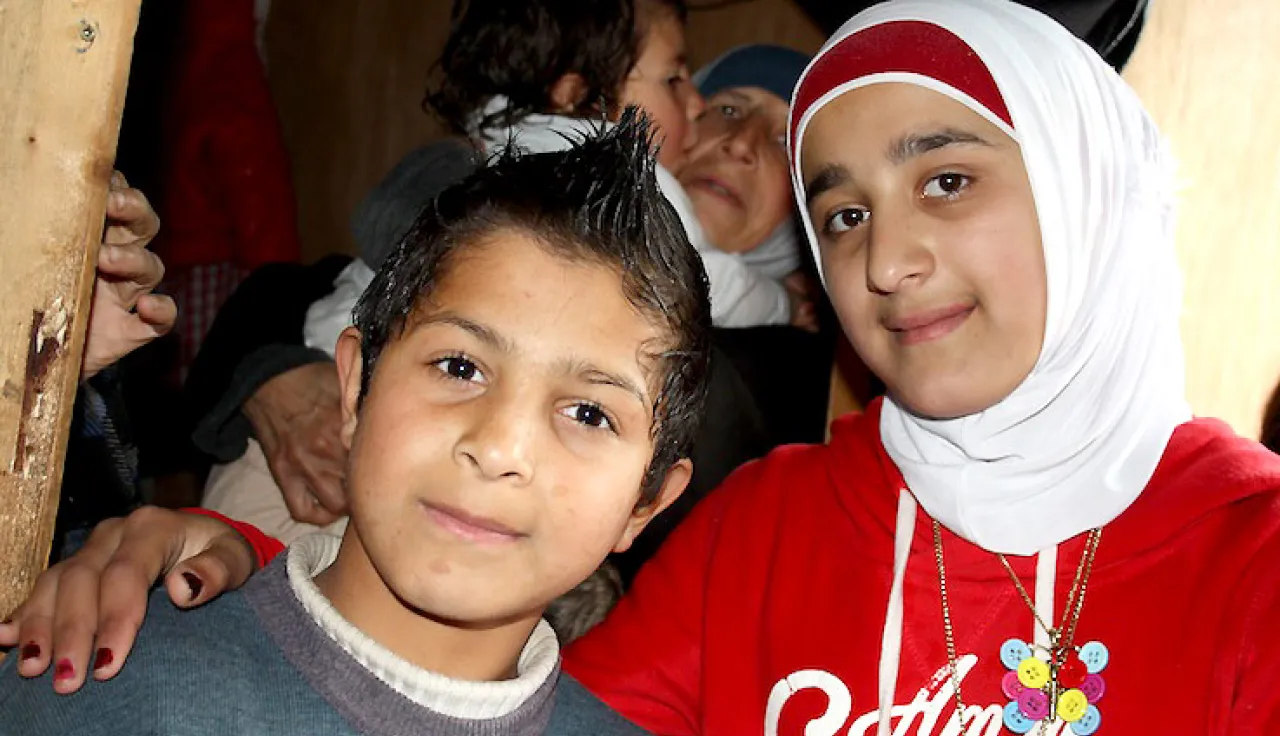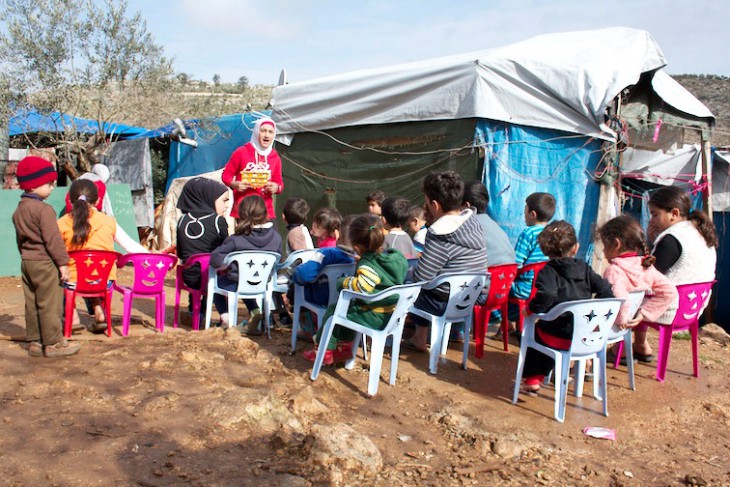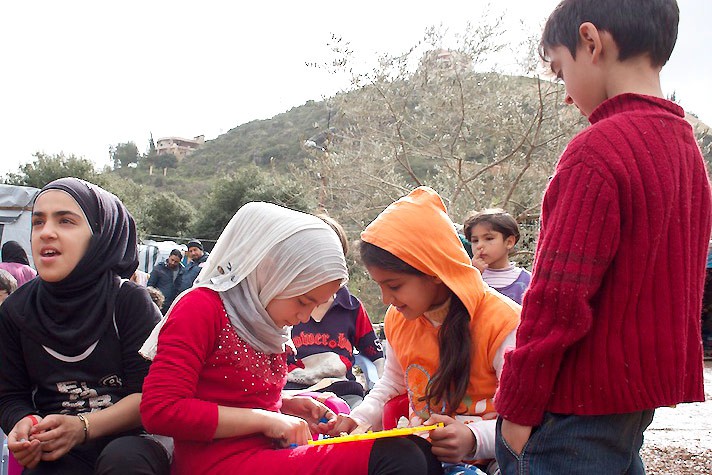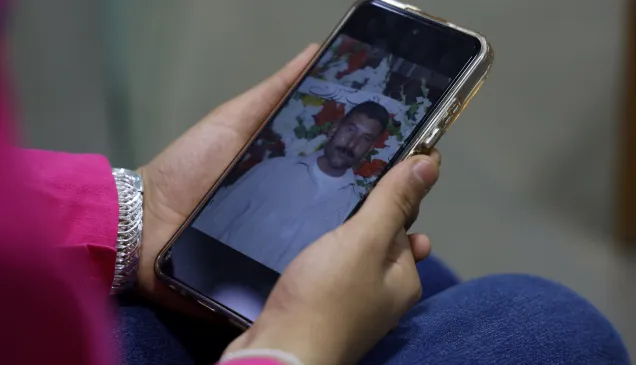Surrounded by olive trees, young Syrians learn their ABCs

Over one million people have fled to Lebanon since the start of the crisis in Syria four years ago. Today they are living with relatives or host families, or sheltering in camps. One recent morning, four visitors from the ICRC and the Lebanese Red Cross spent some time in Ketermaya, one of the informal settlements near the Chouf Mountains.
It was threatening to rain when we reached the camp, and the sagging tarpaulins and flimsy poles of the refugees' bedraggled shelters seemed a poor defense against the coming downpour.
As we climbed a muddy track past scattered olive trees and clumps of red poppies half-hidden in the grass, the sound of children's voices greeted us.
After we entered the camp, the murmur rose to a shout, as a group of schoolchildren chanted the ABCs. Guiding them as a maestro conducts an orchestra was a young girl in a bright red top and a white headscarf. The children sang and giggled, turning in the small plastic chairs to stare at their visitors, all harmony forgotten.
 14-year-old Nejmeh teaches the children out of doors because their classroom was destroyed by the rain.
14-year-old Nejmeh teaches the children out of doors because their classroom was destroyed by the rain.
Their teacher, 14-year-old Nejmeh, has been living with her parents and siblings in Ketermaya for the past year. Originally from Ghouta on the outskirts of Damascus, the family fled the city two years ago as the Syrian crisis worsened and it became too dangerous to stay. It took them three days to reach safety in Lebanon. They first sought shelter in a school, together with other Syrian refugees, and then moved to the huddled grey and blue refuge where they live today.
Ketermaya houses some 50 families, around 300 people in all. They are surviving thanks to the owner of the land, and the generosity of the local community. But despite this help, and the assistance they receive from the Lebanese Red Cross, life for the camp's residents is desperately hard.
We walked around, beneath a sky that alternated between steely grey and pale blue. Around us the children played, oblivious to the weather even when it poured, laughing if they slipped in the mud, bringing to their visitors poppies and dwarf cyclamen from the nearby meadows, and chanting their alphabet song.
 The camp turns into a muddy skating rink when it rains.
The camp turns into a muddy skating rink when it rains.
Iman Kenno, a sixty-three-year-old grandmother, looks after seven of her grandchildren, whose parents -- her own children -- are dead. Squashed into the small tent that has become her home together with a couple of neighbours and their children, they have hardly room to move. Iman chastises a little girl of three who enters soaking wet but wants to go outside again to play in the drumming rain. Iman pulls off the girl's wet, pink jersey as the child wails. Tucked a moment later in her grandmother's arms, the little girl brightens, blowing her visitors kisses, and planting several kisses on the worn cheeks of her grandmother. She is too young to know that both of her parents are part of Syria's tragedy.
As we stood outside between the storms, Nejmeh, the camp's self-appointed teacher, spoke of her wish to help the children learn. For the past month she has been giving them lessons in the open air, arranging rows of blue and pink chairs in front of a large greenboard. "We used to have a classroom, "she says looking rather forlorn. "But the shelter it was in fell down in the rain, and now I have nowhere for the school except outside."
 The children learn English, maths and science.
The children learn English, maths and science.
"I teach the children English, maths and science," she goes on, pointing to the greenboard which is covered in geometry. "It's what I learned in school. I used to be top of my class."
It was not a boast, just a simple statement.
"I give the kids a day off on Fridays and Saturdays," Nejmeh continues, "but I don't want them to miss their lessons on other days."
"I hope, too, that giving them an education will help them forget about their problems and losing their loved ones." This was said with stunning maturity by one who is, herself, hardly more than a child.
Nejmeh hesitates, and then continues: "If we had notebooks and pens, it would be so much easier for the children to remember their lessons, because they could write everything down." Nejmeh herself keeps a diary and writes in it every day.
"Could you take a photo of me?" she suddenly asks. "I want to put it in my diary."
"But only from my knees up. I don't want people to see my feet," she pleads, pointing to her dirty, mud-caked sandals which indeed are a contrast to her brilliant top, modest scarf, and necklace made from a collection of coloured buttons.
While the photo was being taken, she posed like a film star.
 Nejmeh poses like a film star for her photo.
Nejmeh poses like a film star for her photo.
The rain started again in earnest as we were about to leave, dripping off the olive trees, gathering in huge, heavy puddles on the tarpaulin roofs, and turning the camp into a skating rink. The kids waved and chanted a last ABC, all smiles.
For now, the children in Ketermaya are too young to think beyond today. But before long they will lose their innocence and understand the tragedy that has brought them to Lebanon.
And they will realize, too, that like millions of other uprooted, conflict-scarred youngsters back in their homeland, they are part of Syria's humanitarian catastrophe.
Photos: CC BY-NC-ND/ICRC



